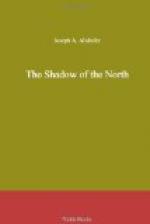He studied the imprint, which turned in, and hence had been made by an Indian. Its great size too indicated to him that it might be that of Tandakora, a belief becoming with him almost a certainty as he found other and similar traces farther on. He followed them about a mile, reaching stony ground where they vanished altogether, and then he turned to the west.
The fact that Tandakora was so near, and might approach again was not unpleasant to him, as Tayoga, having all the soul of a warrior, was anxious to match himself with the gigantic Ojibway, and since the war was now active on the border it seemed that the opportunity might come. But his attention must be occupied with something else for the present, and he went toward the west for a full hour through the primeval forest. Now and then he stopped to listen, even lying down and putting his ear to the ground, but the sounds he heard, although varied and many, were natural to the wild.
He knew them all. The steady tapping was a woodpecker at work upon an old tree. The faint musical note was another little gray bird singing the delight of his soul as he perched himself upon a twig; the light shuffling noise was the tread of a bear hunting succulent nuts; a caw-caw so distant that it was like an echo was the voice of a circling crow, and the tiny trickling noise that only the keenest ear could have heard was made by a brook a yard wide taking a terrific plunge over a precipice six inches high. The rustling, one great blended note, universal but soft, was that of the leaves moving in harmony before the gentle wind.
The young Onondaga was sure that the forest held no alien presence. The traces of Tandakora were hours old, and he must now be many miles away with his band, and, such being the case, it was fit time for him to choose a camp and call his friends.
It pleased Tayoga, zealous of mind, to do all the work before the others came, and, treading so lightly and delicately, that he would not have alarmed a rabbit in the bush, he gathered together dead sticks and heaped them in a little sunken place, clear of undergrowth. Flint and steel soon lighted a fire, and then he sent forth his call, the long penetrating whine of the wolf. The reply came from the north, and, building his fire a little higher, he awaited the result, without anxiety.
The dry wood crackled and many little flames red or yellow arose. Tayoga heaped dead leaves against the trunk of a tree and sat down comfortably, his shoulders and back resting against the bark. Presently he heard the first alien sound in the forest, a light tread approaching That he knew was Willet, and then he heard the second tread, even lighter than the first, and he knew that it was the footstep of Robert.
“All ready! It’s like you, Tayoga,” said Willet, as he entered the open space. “Here you are, with the house built and the fire burning on the hearth!”
“I lighted the fire,” said Tayoga, rising, “but Manitou made the hearth, and built the house which is worthy of Him.”




